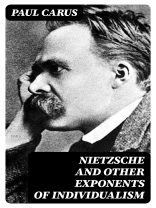In ‘Nietzsche and Other Exponents of Individualism, ‘ Paul Carus delves into the philosophical discourse surrounding individualism in the late 19th and early 20th centuries. Carus employs a rigorous analytical style, combining historical context with a critical examination of key thinkers, including Friedrich Nietzsche, who championed the notion of the ‘Übermensch’ and the affirmation of one’s personal path. This work positions Nietzsche alongside contemporaries who also explored aspects of individuality, allowing readers to navigate the intricate landscape of existential thought and its implications on society and morality. Paul Carus was not only a renowned philosopher but also an influential figure in promoting scientific philosophy. His diverse background in philosophy, psychology, and Eastern religions enabled him to critically engage with Western ideas and their philosophical implications. Carus’s commitment to understanding individualism in its multifaceted nature reflects both his scholarly pursuits and his personal experiences living through a transformative era in philosophical thought. This book is recommended for readers keen on exploring the depths of individualism and its advocates. Carus’s insightful analysis grants a rich understanding of personal autonomy, offering a compelling survey for anyone interested in philosophy, particularly those seeking to grasp the nuances behind the emergence of individualism as a critical moral framework.
Despre autor
Dr. Paul Carus (1852–1919) was a significant German-American author, philosopher, and an early key proponent of interfaith dialogue whose writings spanned a wide array of subjects. His scholarship promoted a philosophy that sought to reconcile science and religion, aiming to construct a framework for understanding universal truth. A prolific writer, Carus was instrumental in popularizing philosophy and religion in terms that were accessible to the educated public of his time. Among his extensive literary corpus, the book ‘Nietzsche and Other Exponents of Individualism’ stands out for its examination of Friedrich Nietzsche’s philosophy and its relation to the broader trend of individualistic thought. In this work, Carus delves into the intricate philosophies of individualism that underpin much of modern existentialist and libertarian thinking, exploring their implications and their diverse proponents. His analysis is informed by a deep understanding of cultural and philosophical history, as well as a nuanced appreciation for the complexity of individual human experience. Carus’s literary style is characterized by clarity, rigor, and a dedication to probing the essential questions of human life and consciousness. Through his contributions to philosophy, Carus left an indelible mark on the scholarly community and provided a bridge between Eastern and Western thought.












